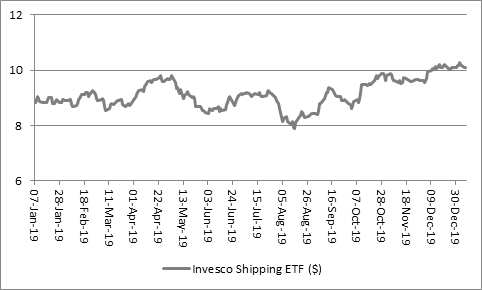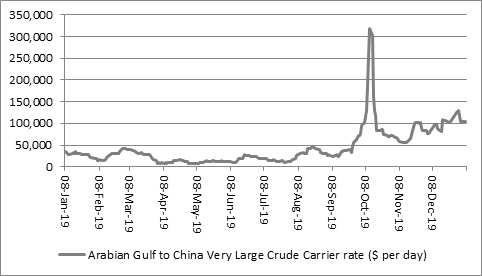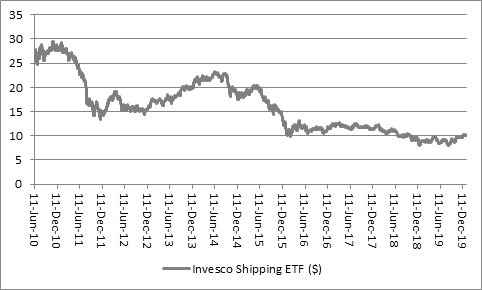“Headline stock indices may be sliding lower as investors wait for President Trump’s response to the Iranian missile attacks on US bases in Iraq, but higher gold and oil prices are giving support to the share prices of those firms which are producing or exploring for those commodities. Another industry which could find favour if tensions remain elevated in the Middle East for some time is shipping,” says Russ Mould, AJ Bell Investment Director.

Source: Refinitiv data
“If a worst case did develop and the conflict in the Middle East escalated, one possible tactic available to Tehran would be to close the Straits of Hormuz, or at least look to restrict traffic flowing through the narrow channel that connects the Gulf to the Indian Ocean.
“The US Energy Information Administration estimates that more than 20 million barrels of oil a day are shipped through the Straits of Hormuz, a fifth of global demand, so any concerted closure of the waters could have a big impact on oil importers.
“This could bring shipping – and the owners of Very Large Crude Carriers (VLCCs) and Ultra Large Crude Carriers (ULCCs) – into the picture. Any disruption to the Straits of Hormuz could increase the need for oil storage at sea and also increase the distance that oil supplies have to travel.
“Both could boost demand VLCCs and ULCCs and do so at a time when supply of vessels is relatively limited thanks to the imposition from 1 January 2020 of tougher emission rules by the International Maritime Organisation (IMO), whereby all ships must use fuel that has less than 0.5% sulphur (rather than 3.5% now) or fit exhaust gas cleaning systems (“scrubbers”).
“Fitting scrubbers takes time and temporarily removes fleet capacity while, in the longer term, the higher-cost low-sulphur fuel could make it uneconomic to run older vessels that have not been retrofitted and potentially persuade owners to scrap them, permanently reducing capacity. In addition, Singapore, California and Belgium are already insisting on the use of cleaner fuel rather than the short-term fix of scrubbers, which make ships heavier and mean they consume more fuel, with the side-effect of increased sulphur emissions.
“Shipbroker Clarkson, a member of the FTSE 250, could potentially benefit from higher bookings and increased shipping rates but the VLCC and ULCC owners themselves would be the most direct beneficiary in the event of major disruption to Middle Eastern shipping lines and crude supply lines. Tanker rates have already started to tick up, thanks to the effects of IMO 2020.

Source: Refinitiv data
“The largest tanker stocks include Belgium’s Euronav; a fleet of US-listed firms, notably Scorpio Tankers, Frontline, SFL Corporation and Nordic American; and Japanese shipping majors Mitsui OSK and Nippon Yusen, although they are not pure plays.
“Investors who do want a potential hedge against an escalation of Middle Easton tensions but do not want to take on stock-specific risk, especially in such an industry as volatile as shipping, could research the US-quoted Invesco Shipping ETF. Designed to track and deliver the performance of the 25-strong Dow Jones Global Shipping Index, minus its running costs, this exchange-traded fund offers exposure to the major tanker names, as well as other shipping sub-sectors such as containers and dry bulk.
“The latest fact sheet suggests the tracker fund’s portfolio in aggregate trades on just one times book, or asset value. Shipping has been in the doldrums for almost a decade but that lowly valuation could look like a decent entry point if VLCC and ULCC rates do get a boost from the Middle East, IMO 2020 or both.

Source: Refinitiv data
